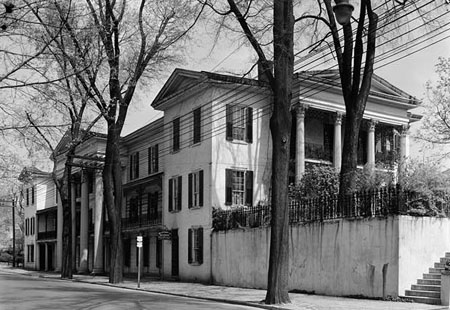27 June 1811–2 Oct. 1883

Frederick Edward Belo, an entrepreneur best known for his construction of the Belo House in Winston-Salem, was born in Salem. Edward was the second child of John Frederick and Maria Strupe Belo [Bölow].
Belo received his primary education in Salem at the Moravian Boys' School, entering in 1817. He then received training in cabinetmaking with a local joiner named Petersen. In 1827, Belo went to Bethlehem, Pa., for further training with a friend of the family. By 1832, he had settled in Philadelphia, but he soon returned to Salem and there married Amanda Fries in 1837. Their marriage produced four sons and three daughters.
As a businessman, Belo was unrivaled in productivity. In addition to his cabinetmaking trade, he ran a linseed oil mill and erected an iron foundry, casting railings, bars, and decorations. Prominent in his community, he was elected an elder in the Moravian church. However, a conflict between Belo's business interests and the ideas of the rest of the elders, exampled by a difference of opinion over Belo's wish to build a stable adjoining a street leading to the cemetery, led Belo increasingly to dissociate himself from the affairs of the church. He left the post of elder and concentrated on his business activities, building dams, mills, and a new dry goods store, the Belo House.
By 1849, Belo's general store was completed, two stories tall with 150 feet of frontage on Main Street. It was constructed of red brick and decorated with Corinthian columns (the models for which he carved) and with iron railings and grills made at his foundry. With the name "Belo" on the front in gold letters, the store was impressive. The first floor was used for business and the second as living quarters for the Belo family; a third story, added in 1860, housed clerks and assistants of the store.
When the Civil War broke out, Belo retired to farm. Later coming out of retirement, he presided over the company that built a railroad between Winston-Salem and Greensboro and was active in developing industry. Belo retired again, to indulge his interest in flowers, and built a greenhouse behind his home for that purpose. He died in Salem and was buried in the Salem Cemetery.